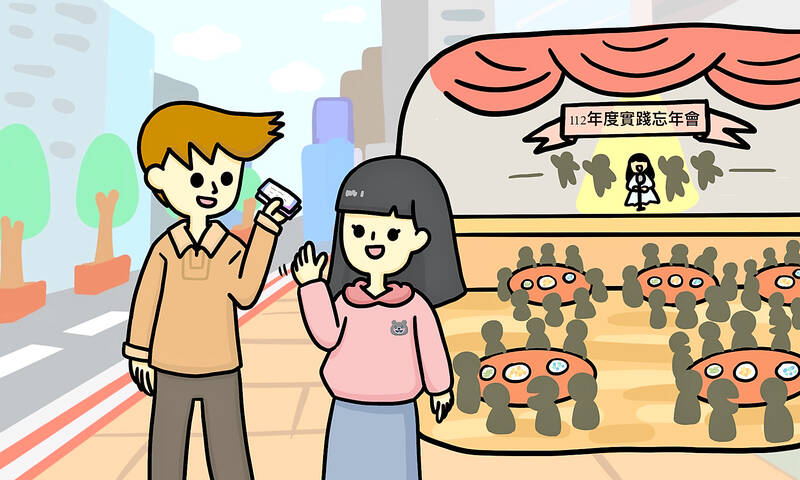對話 Dialogue
馬克:小實,下週五晚上要不要一起去看電影?
Mǎkè: Xiǎoshí, xià zhōu wǔ wǎnshàng yào búyào yìqǐ qù kàn diànyǐng?

小實:不行耶,我答應我媽媽要陪他一起去公司的尾牙。
Xiǎoshí: Bùxíng yé, wǒ dāyìng wǒ māma yào péi tā yìqǐ qù gōngsī de wěi yá.
馬克:「尾牙」?那是什麼活動?
Mǎkè: “wěiyá”? Nà shì shénme huódòng?
小實:是公司舉辦餐會,感謝員工這一年的付出。
Xiǎoshí: Shì gōngsī jǔbàn cān huì, gǎnxiè yuángōng zhè yì nián de fùchū.
馬克:好特別喔,像是公司聚餐嗎?
Mǎkè: Hǎo tèbié ō, xiàng shì gōngsī jùcān ma?
小實:沒錯,有些大公司還會租借體育場請藝人來表演喔。
Xiǎoshí: Méicuò, yǒuxiē dà gōngsī hái huì zūjiè tǐyùchǎng qǐng yìrén lái biǎoyǎn ō.
馬克:哇!聽起來非常熱鬧!
Mǎkè: Wa! Tīng qǐlái fēicháng rènào!
小實:有時候還有抽獎活動,讓員工都能開心的迎接新年!
Xiǎoshí: Yǒu shíhòu hái yǒu chōujiǎng huódòng, ràng yuángōng dōu néng kāixīn de yíngjiē xīnnián!
馬克:希望我以後工作的公司也有這種福利!
Mǎkè: Xīwàng wǒ yǐhòu gōngzuò de gōngsī yěyǒu zhè zhǒng fúlì.
翻譯 Translation
Mark: Xiaoshi, do you want to go see a movie together next Friday night?
Xiaoshi: No, I promised my mother that I would go with her to the company’s year-end party.
Mark: “Year-end party”? What’s that, then?
Xiaoshi: The company is holding a dinner to thank employees for their hard work throughout the year.
Mark: That sounds great. Is it like a corporate banquet?
Xiaomi: Yes, some big companies will rent stadiums and invite artists to perform.
Mark: Wow! Sounds like a lot of fun!
Xiaoshi: Sometimes there are lucky draws so that employees can ring in the New Year with a smile.
Mark: I hope the company I work for in the future will provide such fantastic perks!
單字片語 Vocabulary
1. 尾牙 (wěiyá) year-end party
2. 付出 (fùchū) to pay, effort, hard work
3. 聚餐 (jùcān) dine together
4. 租借 (zūjiè) to lease
5. 藝人 (yìrén) artist, performer
6. 表演 (biǎoyǎn) performance
7. 抽獎 (chōujiǎng) lottery, lucky draw
8. 員工 (yuángōng) staff, employee
9. 迎接 (yíngjiē) to ring in (new year)
10. 福利 (fúlì) welfare, perks (of a job)
教材音檔 Audio Files
教材影片 Video Files:
https://www.instagram.com/celc.nou_tw/guide/_/17999106352646292/
實踐大學華語中心提供
By Shih Chien University Chinese Language Center: https://chineseusc.com/

A: When is the Lantern Festival? B: The festival is celebrated on the 15th day of the first month of the lunar calendar, which fell on Feb. 12 this year. A: Oh no! Did I miss the 2025 Taipei Lantern Festival? B: Yes, you did. But you can still go to the 2025 Taiwan Lantern Festival in Taoyuan, which will run until this Sunday. A: Let’s go admire the exuberant lanterns. A: 元宵節到底是哪一天? B: 就是農曆1月15日啊,今年則落在國曆2月12日。 A: 喔不,我是不是錯過了2025台北燈節? B: 是的,但你還可以去桃園的2025台灣燈會,活動將持續至週日。 A: 那我們去欣賞豐富的花燈秀吧! (By Eddy Chang, Taipei Times/台北時報張聖恩)

Every February, the small town of Ptuj in Slovenia comes alive with the vibrant celebration of its famous carnival. This festival, with its deep historical roots, is a cherished tradition where local residents come together to ward off the winter cold and embrace the arrival of spring. Participants dress up in furry costumes, transforming into kurenti, mythical monsters believed to drive away evil spirits and bring good fortune for the new year. Although the exact origins of the Ptuj carnival remain a mystery, it is firmly rooted in ancient Slavic and Illyrian cultures. The modern form of the carnival

A: What’s the theme of the 2025 Taiwan Lantern Festival’s main lantern? B: The theme is “Paradise,” and the main lantern is a snake-shaped “infinity” symbol that features a lighting show every half an hour. A: Cool, I heard that there are over 300 lanterns. B: There are even giant lanterns in the shape of Pikachu and some other popular Pokemon characters. A: Let’s go now. A: 2025台灣燈會主燈的主題是什麼? B: 主題是「無限樂園」!主燈的造型則是蛇形的數學「無限號」,主燈每半小時還有一次燈光秀。 A: 酷喔,聽說總共有300多件花燈作品。 B: 甚至還有皮卡丘和其他熱門寶可夢角色的巨型花燈呢。 A: 哇我們現在就出發吧! (By Eddy Chang, Taipei Times/台北時報張聖恩)

本文由生成式AI協作,本刊編輯編修。 Tucked away in southwestern Taiwan, Yunlin County is a treasure trove of cultural heritage, rich history, and natural beauty. From its stunning temples and glove puppetry to historical architecture and picturesque landscapes, Yunlin rewards those who venture off the beaten path. Yunlin is renowned for its flourishing temple culture. Temples in this region are not merely places of worship but also communal centers where people gather for festivals, rituals, and social functions. One of the most notable temples here is the Beigang Chaotian Temple, which was built more than 300 years ago and is dedicated to Matsu, the sea